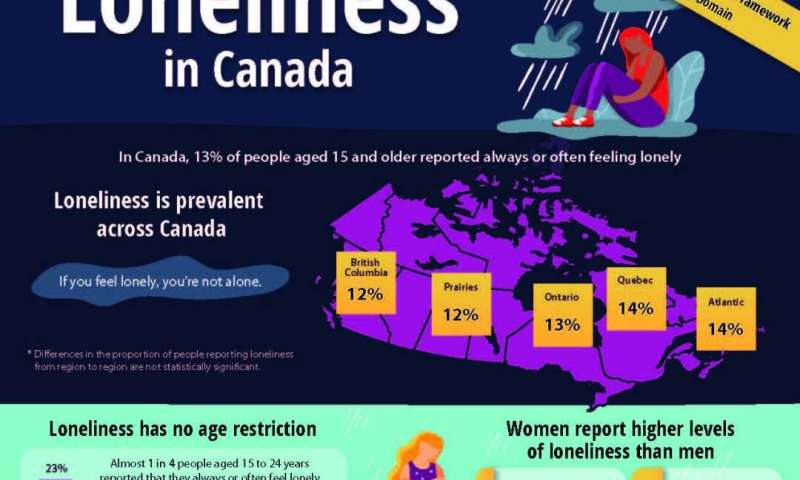
Elvis knew lonely.
And if even the king of rock-and-roll sometimes checked into Heartbreak Hotel down at the end of Lonely Street, it’s hardly surprising that a lot of ordinary Canadians are also feeling a bit forlorn these days.
A Western University expert on loneliness research finds validation, but little consolation, in new national numbers that quantify the emotional impact of isolation during the pandemic.
Newly released data from Statistics Canada shows 13 percent of Canadians 15 years and older reported they often or always were lonely in recent months.
“Clearly it’s not a fluke that we’re seeing this many individuals identifying themselves as lonely, and there’s also a clear trend based on age,” said Western professor and loneliness researcher Julie Aitken Schermer.
The Canadian Social Survey—Well-being, Activities and Perception of Time, conducted in August and September and released this week, shows older seniors and people younger than 25 are feeling the most isolated.
“Does this information make us feel less lonely? No, but it might make us feel less alone in our loneliness,” Schermersaid.
The StatsCan survey is Canada’s first measurement of loneliness for the total population age 15 and older. It measures a point in time, so it offers no pre-pandemic comparison.
But Schermer said she believes the numbers would have been lower than if the same questions were asked even two years ago.
One reason is that the media have raised the idea of loneliness as one consequence of the pandemic, so it’s more acceptable for people to talk about it and to accept that’s what they may be feeling.
The U.K. recently appointed its first Minister for Loneliness, and while that raised some eyebrows internationally, “I can image that a lot of people who were lonely felt vindicated by that,” Schermer said.
Three in 10 respondents told Statistics Canada they sometimes felt lonely, while half the respondents (five in 10) said they rarely or never felt lonely.
Schermer was the first to discover, by studying Australian twins, that loneliness is part of some people’s genetic (inheritable) makeup, even after extracting the effects of personality from the mix.
But while genetic predisposition plays a part, situation and environment remain important factors; lonely people aren’t hardwired to remain that way, her work shows.
The Canadian demographics of loneliness are also borne out by her recent studies of Dutch populations, where the oldest people feel isolated and disconnected because of life changes, with the loss of partners and friends; and where teens and young adults experience lack of connection with peers.
Among youth aged 15 to 24 years, nearly one in four respondents said they always or often felt lonely. The least lonely demographic: Canadians aged 65—74.
The StatsCan survey notes there’s a correlation (but not causation) of loneliness and mental health challenges in the responses: about half of those who always or usually felt lonely also said they had fair or poor mental health.
It also suggests loneliness is a widespread issue, with little variation in answers from province to province. People who lived alone were twice as likely to say they were lonely as people who lived with others.
In Canada, loneliness is included as an indicator in the recently established National Quality of Life Framework, which will be used to identify future federal policy and budgeting priorities.
Missing from the Canadian data is more fine-grained information, such as whether the issue affects urban or rural people differently. (In the Netherlands study, city-dwellers reported being more lonely than rural residents.)
One quarrel Schermer has with the StatsCan numbers is that they suggest women are slightly more lonely than men, as her studies show little difference based on gender.

“Men don’t like to admit to being lonely, which they perceive as a female trait.”
She believes men’s answers in particular would have been more in the affirmative if the survey had asked questions that can act as proxy ideas for the word lonely: relationship satisfaction, isolation or whether respondents felt their lives had significance to others.
Source: Read Full Article
